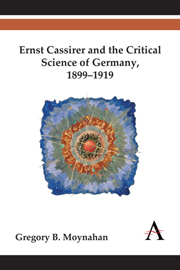Book contents
- Frontmatter
- Dedication
- Contents
- Acknowledgments
- List of Abbreviations
- Introduction “Reading a Mute History”: Ernst Cassirer, the Marburg School and the Crises of Modern Germany
- Part I The Marburg School and the Politics of Science in Germany
- Chapter One The Twentieth-Century Conflict of the Faculties: The Marburg School and the Reform of the Sciences
- Chapter Two Cassirer and the Marburg School in the Administrative and Political Context of the Kaiserreich
- Chapter Three “The Supreme Principles of Knowledge”: Cassirer's Transformation of the Tenets of Cohen's Infinitesimal Method (1882) and System of Philosophy (1902–1912)
- Part II Critical Science and Modernity
- Part III Liberal Democracy and Law
- Conclusion Critical Science, the Future of Humanity and the Riddle of An Essay on Man (1944)
- Index
Chapter One - The Twentieth-Century Conflict of the Faculties: The Marburg School and the Reform of the Sciences
from Part I - The Marburg School and the Politics of Science in Germany
Published online by Cambridge University Press: 05 September 2013
- Frontmatter
- Dedication
- Contents
- Acknowledgments
- List of Abbreviations
- Introduction “Reading a Mute History”: Ernst Cassirer, the Marburg School and the Crises of Modern Germany
- Part I The Marburg School and the Politics of Science in Germany
- Chapter One The Twentieth-Century Conflict of the Faculties: The Marburg School and the Reform of the Sciences
- Chapter Two Cassirer and the Marburg School in the Administrative and Political Context of the Kaiserreich
- Chapter Three “The Supreme Principles of Knowledge”: Cassirer's Transformation of the Tenets of Cohen's Infinitesimal Method (1882) and System of Philosophy (1902–1912)
- Part II Critical Science and Modernity
- Part III Liberal Democracy and Law
- Conclusion Critical Science, the Future of Humanity and the Riddle of An Essay on Man (1944)
- Index
Summary
Ever since its first publication in 1883, Hermann Cohen's text The Principle of the Infinitesimal Method and Its History: A Chapter on the Foundations of the Critique of Knowledge has formed a puzzle for all but close followers of the Marburg school. The text is widely considered to mark a shift in Cohen's thought and to establish the most influential direction of the school, and with it began the school's enormous influence in German philosophical, legal and scientific thought in the three decades before the First World War. Intended, however improbably, to form something of a “popularization” of Cohen's ideas, the text formed the germ of Cohen's own philosophy as initiated in the second edition of his Kant's Theory of Experience two years later and developed in his late System of Philosophy (1902–1912). It is true that the puzzle for many readers of Infinitesimal Method was simply its contents, for despite its purportedly approachable form, it was widely considered extremely difficult and occasionally accused of being needlessly opaque. The philosopher Friedrich Kuntze noted that “Cohen's book is generally considered to be one of the most difficult books of German philosophy, and one can hear from considerate people that the only thing they understood in the work were the citations from foreign authors.” Kuntze claimed that this difficulty stemmed from the challenging conceptual nature of the infinitesimal as much as it did from Cohen's style.
- Type
- Chapter
- Information
- Publisher: Anthem PressPrint publication year: 2013

